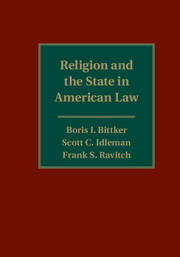Book contents
- Frontmatter
- Dedication
- Contents
- Preface
- 1 History and Introduction
- 2 Church and State in the Nineteenth Century
- 3 Religious Influences and Expressions in Law and Government
- 4 The Establishment Clause
- 5 The Free Exercise Clause
- 6 The Religious Test, Equal Protection, and Free Speech Clauses
- 7 The Definition of Religion
- 8 Church Property Disputes and Church Schisms
- 9 Contracts
- 10 Taxation
- 11 Employment
- 12 Land Use
- 13 Torts
- 14 Criminal Law and Process
- 15 Family Law
- 16 Public Education
- 17 Religious Symbolism on Government Property
- 18 Special Contexts: Prisons and the Military
- Appendix A Federal Constitutional Provisions
- Appendix B State Constitutional Provisions
- Appendix C Selected Federal Statutes 910
- Index
13 - Torts
Published online by Cambridge University Press: 05 October 2015
- Frontmatter
- Dedication
- Contents
- Preface
- 1 History and Introduction
- 2 Church and State in the Nineteenth Century
- 3 Religious Influences and Expressions in Law and Government
- 4 The Establishment Clause
- 5 The Free Exercise Clause
- 6 The Religious Test, Equal Protection, and Free Speech Clauses
- 7 The Definition of Religion
- 8 Church Property Disputes and Church Schisms
- 9 Contracts
- 10 Taxation
- 11 Employment
- 12 Land Use
- 13 Torts
- 14 Criminal Law and Process
- 15 Family Law
- 16 Public Education
- 17 Religious Symbolism on Government Property
- 18 Special Contexts: Prisons and the Military
- Appendix A Federal Constitutional Provisions
- Appendix B State Constitutional Provisions
- Appendix C Selected Federal Statutes 910
- Index
Summary
Religious institutions and entities can be involved in tort cases just like other institutions and entities. Given constitutional considerations, however, there are some unique questions that arise when tort claims are brought against, or by, religious institutions or entities. These issues will be explored in this chapter in the context of the various tort causes of action that arise in religion contexts.
The sorts of tort claims that can arise when religious institutions and entities are involved include both intentional and negligence-based torts. These issues can arise from garden-variety tort claims such as a slip and fall on church property or from more serious issues such as sexual abuse by clergy. Some of the more common causes of action that arise, especially in clergy abuse cases, include negligent supervision, negligent hiring and retention, intentional infliction of emotional distress, negligent infliction of emotional distress, tortious breach of fiduciary duty, assault and battery (by the clergy member or other abuser), loss of consortium, and false imprisonment. As will be seen, these claims meet with varying levels of success.
Additionally, claims have been brought by or against religious entities for defamation, trespass, nuisance, invasion of privacy, conversion, negligence, and even products liability. Again, these claims have varying amounts of success depending on the facts of the cases and the jurisdictions in which they are filed. As you will see, one tort that is virtually never successful – at least not when characterized as such – is clergy malpractice.
Various factors can affect outcomes in these cases. Obviously, the variety of tort law concepts among jurisdictions is a major factor. Additionally, if a court must delve into ecclesiastical matters, the First Amendment generally will prevent it from doing so. Relatedly, the availability of neutral principles of law to resolve the claim may be relevant. Whether or not the victim is a member of the religious entity is also a key factor because it can have significant impact on whether constitutional norms are involved and to what degree.
- Type
- Chapter
- Information
- Religion and the State in American Law , pp. 572 - 633Publisher: Cambridge University PressPrint publication year: 2015



